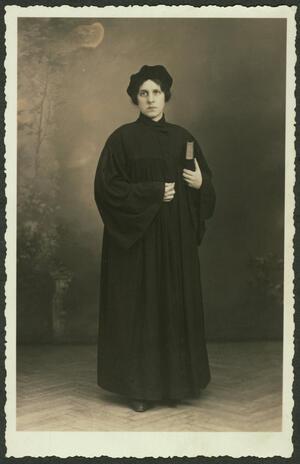Remembering Rabbi Regina Jonas
I decided I wanted to be a rabbi when I was sixteen years old. At that time, I had never heard of Regina Jonas. I was well into my rabbinic training before one of my professors mentioned her to me. He knew her personally, having attended the same academic institution in Germany. I discovered, however, that very little had been written about her and that basically her story had been lost, as was the case for so many other women in the Jewish community whose stories were hidden away.
One of the great gifts Jewish feminism has given us is the recovery of these stories. How fortunate we are that the Jewish Women’s Archive, under the distinguished leadership of Dr. Gail Reimer, has made them available to us and is protecting them for future generations. Had I known more about Regina Jonas when I was studying for the rabbinate, I most certainly would have welcomed her as a role model at a time when so few women in any field had successfully entered what was then a man’s world. I am privileged to speak about my career in congregations and communities all across our country, and when I do, whether individually or as part of the Four Firsts, I always tell a little bit about Regina Jonas and give her credit for being the first woman rabbi. In so doing, I hope to bring honor to her memory.
After reading Elisa Klapheck’s ground-breaking study, I feel that Regina Jonas and I are kindred spirits. I share her love for Jewish tradition and for preaching and teaching. I faced many of the same challenges that she faced and embraced many of the same ideals, particularly her belief that every person, man or woman, should be given an opportunity to realize his or her God-given potential. I was always held to a higher standard as a woman, as was she, and often male rabbis and lay leaders told me to be “patient.” I hold her in highest esteem for choosing to remain with her people during the horrors of the Holocaust.
I find it most interesting that before being deported to Theresienstadt, Rabbi Jonas gave her documents to the Berlin Jewish community for safekeeping. Had she not done so we would know even less than we do now about her life and the significant contributions she made to the Jewish community which continue to bear fruit even today. Not realizing that I was in effect following in her footsteps, I announced several years ago that I would be donating my documents and papers to the American Jewish Archives in Cincinnati, and I invited all female rabbis of whatever denomination to do the same so that those doing research on the history of women in the rabbinate can come to one place and find what they need. I am grateful to Rabbi Gary Zola for his encouragement and support in this effort and for his leadership in making possible our trip in memory of Rabbi Regina Jonas. The United States Commission for the Preservation of America’s Heritage Abroad should be commended for its decision to remember a woman who touched the lives of so many and made a lasting difference in the world.



